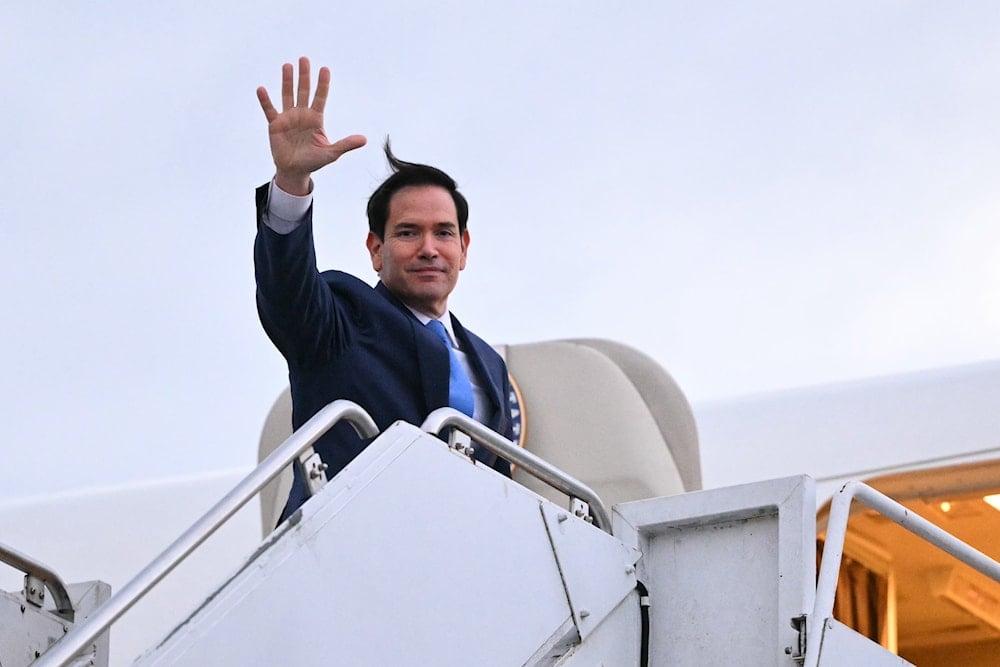US designates four European antifa groups as 'terrorist organizations'
The US has designated four Europe-based anti-fascist networks as "terrorist", expanding politicization of counter-terrorism pretexts to include left-wing and anarchist groups.
-

United States Secretary of State Marco Rubio waves as he boards a plane to depart from the John C. Munro Hamilton International Airport in Hamilton, Ontario, Canada, on November 12, 2025 (Pool Photo via AP)
The United States Department of State announced that four Europe-based anti-fascist networks will be designated as Specially Designated Global Terrorists (SDGT) and added to the Foreign Terrorist Organization (FTO) list on November 20.
The move, announced by senior US officials, marks the first time Washington has applied the terrorism label to groups tied to the loose “antifa” movement in Europe and expands the administration’s politicization of counter-terrorism to include left-wing and anarchist networks.
What the designation does, who is affected
Under the SDGT and FTO labels, the groups’ assets subject to US jurisdiction may be frozen, and US persons and entities face criminal liability for providing material support. The designation also enables visa restrictions and broader financial measures against associates and supporters. US officials said the measure is intended to disrupt transnational support networks and to signal a stricter posture toward what the administration calls “politically-motivated left-wing violence.”
The groups named by Washington include Germany’s Antifa Ost, Italy’s Informal Anarchist Federation/International Revolutionary Front (FAI/IRF), and two Greece-based groups named in the US statement as Armed Proletarian Justice and Revolutionary Class Self-Defense. US officials alleged the networks have carried out bombings, targeted attacks on state infrastructure, and confrontations with perceived right-wing actors across several European countries.
Allegations and the problem of decentralization
US officials justified the move by claiming a string of violent incidents across Europe that they attribute to these networks. The allegations include instances ranging from assaults on individuals to explosive attacks on public infrastructure; however, experts and civil liberties groups say the evidence is complicated by the highly decentralized character of “antifa”-style activism, which lacks a single hierarchy or unified command. That decentralization raises legal and conceptual questions about applying a foreign terrorist organisation label traditionally used against hierarchical transnational groups.
For anti-imperialist or resistance-oriented movements that have already been designated SDGT and FTO by Washington, the US decision reinforces a longstanding critique that Washington’s counter-terrorism labels prioritize political objectives rather than threat assessments.
Read more: Millions to march in 'No Kings' protests against Trump’s crackdown
Exporting domestic Antifa crackdown
The decision to label four European anti-fascist networks as "terrorist" by Washington does not emerge in a vacuum; it aligns closely with the Trump administration’s recent escalation of its domestic campaign against “Antifa".
On September 22, US President Donald Trump signed an executive order formally designating Antifa as a "domestic terrorist organization," describing it as “a militarist, anarchist enterprise” allegedly seeking to overthrow the US government through coordinated violence.
Just days later, Trump issued a National Security Presidential Memorandum (NSPM‑7), tasking the FBI’s Joint Terrorism Task Forces (JTTFs) to coordinate a nationwide strategy to “investigate, prosecute, and disrupt” individuals and networks associated with politically motivated violence, particularly those linked to what his administration defines as organized left-wing and anti-fascist “extremism.”
Washington is now framing far-left activism as a core part of its national security paradigm.
The Brennan Center for Justice contends that Antifa is a diffuse movement, not a coherent organization, and that there is no statute in US law authorizing the president to designate a domestic ideological movement as a terrorist group.
Legal scholars also warn that the executive order could undermine First Amendment protections and be used to justify broader suppression of dissent. In this light, Washington’s new European terrorism designations can be seen not only as a geopolitical move but also as a logical extension of its domestic strategy, a way to export its ideological confrontation with “Antifa” into the international arena, using the same coercive tools and narratives.
Read more: Trump vows antifa crackdown after Charlie Kirk killing

 4 Min Read
4 Min Read










